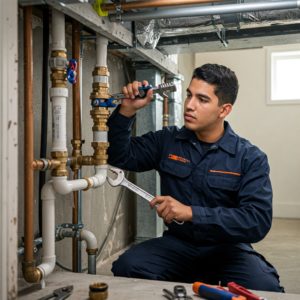5 Plumbing Mistakes Often Made
5 Common Plumbing Mistakes You Should Avoid
Plumbing is an integral part of our daily lives, from the simple act of washing our hands to the more complex systems that keep our homes functioning. However, many homeowners unknowingly make plumbing mistakes that can lead to costly repairs and disruptions to their daily routines. In this article, we’ll discuss five common plumbing mistakes to avoid and how to prevent them.
1. Neglecting Regular Plumbing Maintenance
One of the most common plumbing mistakes is neglecting regular maintenance. Just like any other system in your home, your plumbing system requires periodic care to ensure optimal performance and longevity. Regular maintenance can help identify potential problems early on, such as leaks, which can lead to costly water damage and mold growth. It can also prevent more serious issues from developing, saving you from expensive emergency repairs.
2. Hiring Unlicensed Plumbers
While hiring a handyman for minor repairs might seem like a cost-effective solution, it’s crucial to remember that plumbing work often requires specialized knowledge and licensing. Licensed plumbers are trained and certified to handle complex plumbing issues, comply with local building codes, and carry the necessary insurance to protect you in case of accidents. Hiring an unlicensed plumber can lead to botched repairs, safety hazards, and potential legal issues.
3. Attempting DIY Plumbing Repairs
Many homeowners are tempted to tackle minor plumbing issues themselves, believing they can save money and time. However, DIY plumbing repairs can often lead to more significant problems and even worsen the initial issue. Plumbing systems are complex, and even seemingly simple repairs can have unintended consequences. It’s always best to leave plumbing work to the professionals to ensure the job is done correctly and safely.
4. Relying on Chemical Drain Cleaners
Chemical drain cleaners might seem like a quick fix for clogged drains, but they can cause more harm than good. These harsh chemicals can corrode pipes, 1 damage septic systems, and even pose health risks. Instead of reaching for chemical cleaners, try natural alternatives like baking soda and vinegar, or better yet, call a professional plumber. They have the tools and expertise to clear clogs effectively and safely.
5. Ignoring Plumbing Emergencies
When a plumbing emergency occurs, such as a burst pipe or overflowing toilet, it’s easy to panic. However, taking immediate action can minimize damage and prevent further complications. The first step is to locate and shut off the main water supply to your home. This will prevent the leak from worsening and causing significant water damage. Then, contact a reliable plumber to assess the situation and make the necessary repairs.
Additional Tips to Protect Your Plumbing System
- Regularly inspect your plumbing fixtures for leaks and signs of wear and tear.
- Avoid flushing anything other than toilet paper down the toilet.
- Use a strainer in your kitchen sink to catch food particles.
- Be mindful of what you pour down your drains.
- Install water-saving fixtures to reduce water consumption and potential leaks.
-
Bonus Tips for Plumbing Protection:
- Regularly Check for Leaks: Conduct routine inspections of all plumbing fixtures and pipes for signs of leaks, drips, or moisture.
- Install High-Quality Fixtures: Invest in high-quality faucets, toilets, and showerheads that are durable and less prone to leaks.
- Protect Pipes During Cold Weather: Insulate exposed pipes during cold weather to prevent freezing and potential burst pipes.
- Be Mindful of What You Flush: Only flush toilet paper and human waste down the toilet. Avoid flushing anything else, such as wipes, paper towels, or food scraps.
- Maintain Your Water Heater: Flush your water heater annually to remove sediment buildup and ensure optimal performance.
By following these tips and prioritizing preventative maintenance, you can significantly reduce the risk of plumbing problems and ensure a smooth-running and long-lasting plumbing system for years to come. Remember, when in doubt, always consult with a licensed and insured plumber for expert advice and assistance.
By following these tips and avoiding the common plumbing mistakes outlined above, you can protect your plumbing system, prevent costly repairs, and ensure a smooth-running household for years to come. Remember, when in doubt, it’s always best to consult with a licensed plumber for expert advice and assistance.

